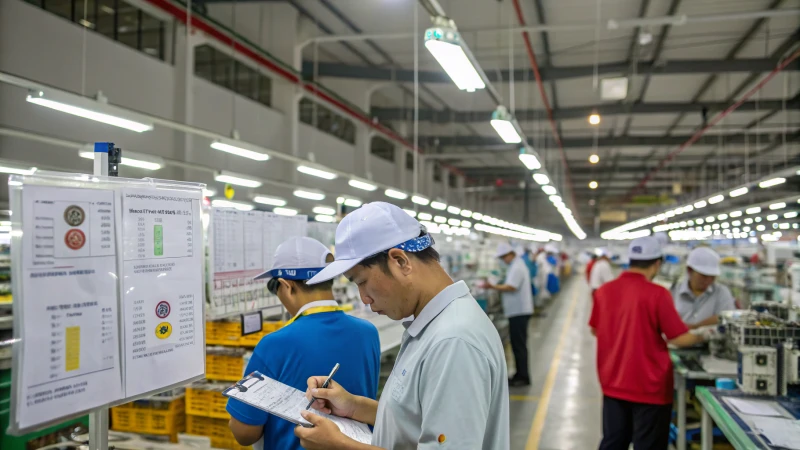
Ever felt the frustration of receiving a bulk order that just didn't meet your expectations?
To prevent quality decline in repeated bulk orders, I focus on setting clear product specifications, nurturing strong supplier relationships, conducting regular quality audits, and using sampling protocols along with a continuous feedback loop.
I remember the first time I received a massive shipment that was off the mark—my heart sank! That's when I learned the importance of clarity from the get-go. By establishing standardized specifications, I ensure everyone is on the same page about what’s expected. Partnering with suppliers isn't just about transactions; it's about building trust. Regular chats and constructive feedback have made a world of difference in my experience. Plus, having those quality checks and sample evaluations in place means I can catch any hiccups before they snowball. This proactive approach has not only saved me countless headaches but also strengthened my supplier relationships.
Regular quality audits are essential for maintaining order quality.True
Audits identify issues early, ensuring consistent product quality.
Ignoring supplier relationships has no impact on order quality.False
Strong supplier ties ensure adherence to specifications and standards.
How Do Standardized Specifications Enhance Quality Control?
I remember the first time I truly understood the power of standardized specifications in quality control—it was like discovering the secret ingredient in my grandmother's famous recipe.
Standardized specifications are the unsung heroes of quality control, setting clear criteria for products or services to ensure consistency, minimize errors, and enhance communication across all production stages.

The Foundation of Consistency
Think of standardized specifications as the GPS for manufacturers and suppliers. When I started out in quality management, I learned that without clear directions on materials, dimensions, and performance, chaos reigned. These specifications1 provide the detailed road map everyone needs to follow, ensuring that each product meets the high bar we set. This is especially crucial in industries where precision isn't just preferred—it's essential.
Communication and Clarity
Have you ever played a game of telephone? Misunderstandings can spiral out of control quickly. In my experience, standardized specifications act as a universal language, reducing the chance of errors among buyers, suppliers, and production teams. When everyone is on the same page, effective communication2 becomes second nature.
Facilitating Compliance
Early in my career, I discovered the relief that comes with aligning standardized specifications with industry regulations. It's like getting a two-for-one deal; by meeting these specs, compliance with legal and safety requirements falls into place naturally. It's one less thing to worry about knowing that industry standards3 are already woven into our daily operations.
Tools for Quality Assurance
Incorporating standardized specifications into our processes felt like unlocking a new level in a video game. Systematic audits and inspections become more straightforward when you have a fixed set of criteria to measure against. This proactive approach means catching issues early and fixing them before they snowball into bigger problems.
| Specification Aspect | Example | Importance |
|---|---|---|
| Material Quality | Specific alloys for durability | Ensures longevity |
| Dimensional Accuracy | Exact measurements for parts | Fits seamlessly |
| Performance Metrics | Load-bearing capacity | Meets safety needs |
Case Studies: Industry Applications
I've seen firsthand how industries like automotive and electronics rely on standardized specifications to deliver quality consistently. In automotive, for example, each component must fit together perfectly—a non-negotiable aspect when it comes to automotive safety4. These standards create a dependable framework that drives uniformity and reliability across the board.
By embracing standardized specifications, I've learned they're not just bureaucratic red tape—they're foundational to ensuring quality control across various sectors.
Standardized specifications reduce production errors.True
Shared standards minimize misunderstandings, reducing error rates in production.
Compliance with regulations is independent of specifications.False
Specifications often align with regulations, simplifying compliance processes.
How Can Effective Vendor Relationship Management Impact Quality?
Have you ever wondered how building a strong rapport with your vendors can transform your business quality game? Let me take you on a journey through the world of vendor relationship management (VRM) and its remarkable impact on product quality.
Effective vendor relationship management enhances product quality by fostering clear communication, mutual trust, and continuous feedback. This collaboration ensures consistency, reduces defects, and promotes innovation in production processes.

Building Trust and Communication
Reflecting on my own experiences, I've found that the key to effective vendor management5 often lies in the trust and open communication channels we establish with our suppliers. I remember when I first realized the power of simply sitting down with a supplier over a cup of coffee and clearly sharing my expectations. It seemed to lift a veil of uncertainty, allowing us to work more seamlessly together.
Implementing regular meetings, sharing detailed feedback, and involving vendors in planning processes can lead to a stronger partnership. This proactive approach helps suppliers align more closely with your quality standards, ensuring that production meets or exceeds expectations consistently.
Implementing Quality Standards
I've learned that creating standardized specifications isn't just about ticking boxes. It's about laying down a clear path for consistent quality across every single order. Think of it as giving your vendors a treasure map, where the "X" marks exactly what you need.
| Quality Control Measures | Description |
|---|---|
| Standardized Specifications | Detailed product specs covering materials and design |
| Regular Audits | Inspections before production and shipment |
| Sampling Protocols | Pre-production samples and random checks |
Ensuring adherence to these standards is an ongoing process, demanding continuous oversight and a readiness to adapt based on feedback.
Leveraging Feedback Loops
In my journey, establishing a continuous feedback loop has been like having an insightful friend who's always got your back. By offering vendors detailed performance assessments, they've been able to fine-tune their processes swiftly, addressing any hiccups that might arise.
These feedback loops create a dynamic relationship where both parties strive towards shared goals. It's a cooperative atmosphere that's fostered innovation and encouraged our vendors to invest in improvements, enhancing the quality of our products continuously.
The Role of Technology in VRM
In this digital age, I've seen technology become an indispensable ally in modern VRM. It's like having a bird's eye view over all supplier performance activities. With data analytics tools at our fingertips, we've been able to spot trends, pinpoint areas needing improvement, and make informed decisions faster than ever.
Take, for example, our implementation of a vendor management system6. It's automated so many interactions, freeing us up for more meaningful engagement. These systems have become treasure troves of insights into vendor performance metrics, helping us maintain high-quality standards effectively.
Embracing these technological advancements has truly transformed how we manage vendor relationships, leading to improved product quality and operational efficiency. And honestly, it's made our work lives so much easier.
Regular audits ensure consistent product quality.True
Audits help verify compliance with standards, reducing defects.
Feedback loops hinder vendor innovation.False
Feedback loops encourage improvement and innovation by addressing issues.
Why Are Regular Quality Audits Crucial for Bulk Orders?
I once learned the hard way how crucial regular quality audits are when I found myself knee-deep in a mountain of defective products. Let me tell you, it was a nightmare that could've been avoided.
Regular quality audits are essential for bulk orders because they ensure consistency in meeting standards, identify defects early, and keep suppliers accountable. These audits help catch issues before products reach customers, saving both reputation and resources.

Ensuring Compliance with Standards
Imagine placing an order for thousands of items, only to find out they don't meet the required standards. I remember a time when a batch of products arrived, and they were completely off-spec. That's when I realized how important it is to have quality audits in place. They ensure that products comply with both industry standards7 and specific organizational needs. This not only saves money by avoiding penalties but also boosts our brand's reputation.
Early Detection of Defects
Picture this: you're about to ship a huge order, and suddenly you discover defects that could've been caught much earlier. Been there, done that! Regular audits are like the heroes that step in to prevent such disasters by catching defects early in the production process. This way, we save on costs and headaches, ensuring only top-notch products reach our customers.
Supplier Accountability
Maintaining quality isn't just about us; it's also about keeping suppliers on their toes. Regular audits create a transparent relationship with suppliers, holding them accountable to the agreed-upon standards. This fosters trust and strengthens our partnerships8, ensuring everyone benefits.
Enhancing Process Efficiency
Quality audits aren't just about finding flaws—they're about finding efficiencies too. I once discovered through an audit that some processes were taking way longer than necessary. Addressing these inefficiencies helped streamline operations, cut costs, and boost productivity. With better processes, handling bulk orders becomes a breeze, leading to timely deliveries and happy customers.
| Benefits of Quality Audits | Description |
|---|---|
| Compliance | Ensures products meet standards |
| Defect Prevention | Detects issues early, saving costs |
| Supplier Accountability | Encourages reliable supplier practices |
| Efficiency | Improves production processes |
Feedback for Continuous Improvement
There's always room for improvement, right? Quality audits give us invaluable insights into our production processes. With detailed feedback, we can continuously refine our practices9 and make informed decisions that enhance product quality over time. It’s like having a roadmap for consistent excellence in every bulk order.
Quality audits ensure compliance with industry standards.True
Audits verify products meet industry and organizational standards.
Regular audits increase production costs significantly.False
Audits save costs by detecting defects early, not increasing them.
Why is maintaining a continuous feedback loop with suppliers so important?
Have you ever felt the frustration of a delayed order or a product that just didn’t meet your expectations?
A continuous feedback loop with suppliers is the backbone of quality assurance and mutual growth, fostering open communication and enabling proactive adjustments to meet evolving business needs.

I remember vividly the time when I eagerly awaited a bulk shipment, only to be dismayed by subpar quality and several days of delay. It was then I realized how vital it was to maintain an ongoing dialogue with our suppliers.
Enhancing Product Quality and Consistency
Having a continuous feedback loop allows me to communicate our quality expectations10 clearly and regularly to our suppliers. I’ve learned that by sharing detailed feedback about previous orders, I can help them fine-tune their processes, which in turn elevates product quality. This kind of ongoing dialogue ensures that any deviations in specifications are quickly corrected, significantly reducing the risk of receiving goods that don’t meet our standards.
Building Stronger Supplier Relationships
Regular feedback has helped me foster a culture of transparency and trust. I find that offering constructive critiques while also celebrating successes really strengthens our bonds with suppliers. This open line of communication often leads to more favorable terms, priority services, and sometimes even sparks collaborative innovations. I’ve seen firsthand how this mutual understanding can transform suppliers from mere transactional vendors into strategic partners.
Proactive Issue Resolution
One of the biggest advantages of having a continuous feedback loop is the ability to spot and address issues before they snowball into bigger problems. By addressing concerns promptly, I can prevent disruptions in our supply chain and avoid potential losses. Suppliers who receive regular feedback are usually quick to implement corrective measures, ensuring that similar problems don’t crop up in future shipments.
Adapting to Changing Market Conditions
The business landscape is always shifting, and having a continuous feedback loop helps me stay on top of changes in market demands and trends. By effectively communicating these changes to our suppliers, I ensure that our supply chain remains aligned with our strategic goals. This means our suppliers can adjust their production processes or materials to meet new requirements efficiently.
Example Feedback Table
| Feedback Aspect | Details Provided | Action Taken by Supplier |
|---|---|---|
| Material Quality | Reports of inconsistencies in texture | Implemented stricter QC measures |
| Delivery Timeliness | Delays noted in last two shipments | Adjusted scheduling processes |
| Product Specifications | Slight deviation from agreed measurements | Revised measurement protocols |
By consistently engaging in a feedback loop, I not only bolster our supply chain resilience but also drive innovation through collaborative efforts with our suppliers. Building this framework11 has become a strategic investment for ensuring long-term success.
Continuous feedback improves product quality.True
Feedback allows suppliers to refine processes, enhancing quality.
Supplier relationships weaken with regular feedback.False
Regular feedback fosters trust and strengthens supplier relationships.
Conclusion
To prevent quality decline in bulk orders, establish clear specifications, maintain strong supplier relationships, conduct regular audits, and implement continuous feedback loops for consistent product quality.
Discover the components and importance of standardized specifications in maintaining product quality in manufacturing. ↩
Learn how shared specifications enhance clarity and understanding among stakeholders. ↩
Explore how industry standards align with standardized specifications to ensure compliance. ↩
Understand how the automotive industry uses standardized specifications to ensure safety and performance. ↩
Explore how effective vendor management strategies foster trust and communication between businesses and suppliers. ↩
Discover how vendor management systems enhance supply chain efficiency and support quality improvement. ↩
Learn how compliance with industry standards protects your brand and ensures high-quality products. ↩
Discover how strong supplier relationships can lead to better quality control. ↩
Explore strategies for continuous improvement in quality control processes. ↩
Learn how consistent feedback mechanisms enhance supplier quality control, ensuring reliable product standards. ↩
Understand the benefits of a structured supplier feedback framework for sustained business growth and innovation. ↩






